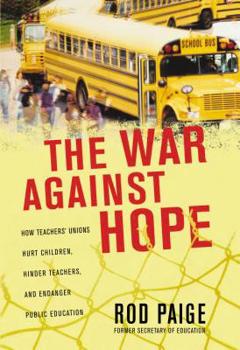The War Against Hope: How Teachers' Unions Hurt Children, Hinder Teachers, and Endanger Public Education
Something is terribly wrong with America's public school system. For decades, we have seen test scores slide or stagnate (today fewer than twenty percent of our nation's twelfth graders are proficient in math, and our students rank near the bottom in science and math among the industrialized nations of the world) and achievement gaps persist or widen. So who's responsible for the ongoing failure of our education system? In "The War Against Hope," former Secretary of Education Rod Paige pulls no punches in his critical analysis of America's crisis in the classroom. Without question, the greatest impediment to meaningful school reform is the enormous, self-aggrandizing power wielded by the teachers' unions. In this vital, well-documented book, Paige takes an unflinching look at the power-hungry union leaders who have consistently placed their ambitions ahead of the needs of the teachers and the students whom they claim to serve. He also traces the history of the National Education Association (NEA) from its humble beginnings as an advocate of education excellence to its early radicalization by left-wing ideology. "The War Against Hope" is a disturbing account of the corruption, greed, and skewed values that have assaulted our schools, betrayed our teachers, and forsaken our children for far too long.
Format:Hardcover
Language:English
ISBN:159555002X
ISBN13:9781595550026
Release Date:January 2007
Publisher:Thomas Nelson Inc
Length:224 Pages
Weight:1.00 lbs.
Dimensions:9.3" x 1.0" x 6.3"














